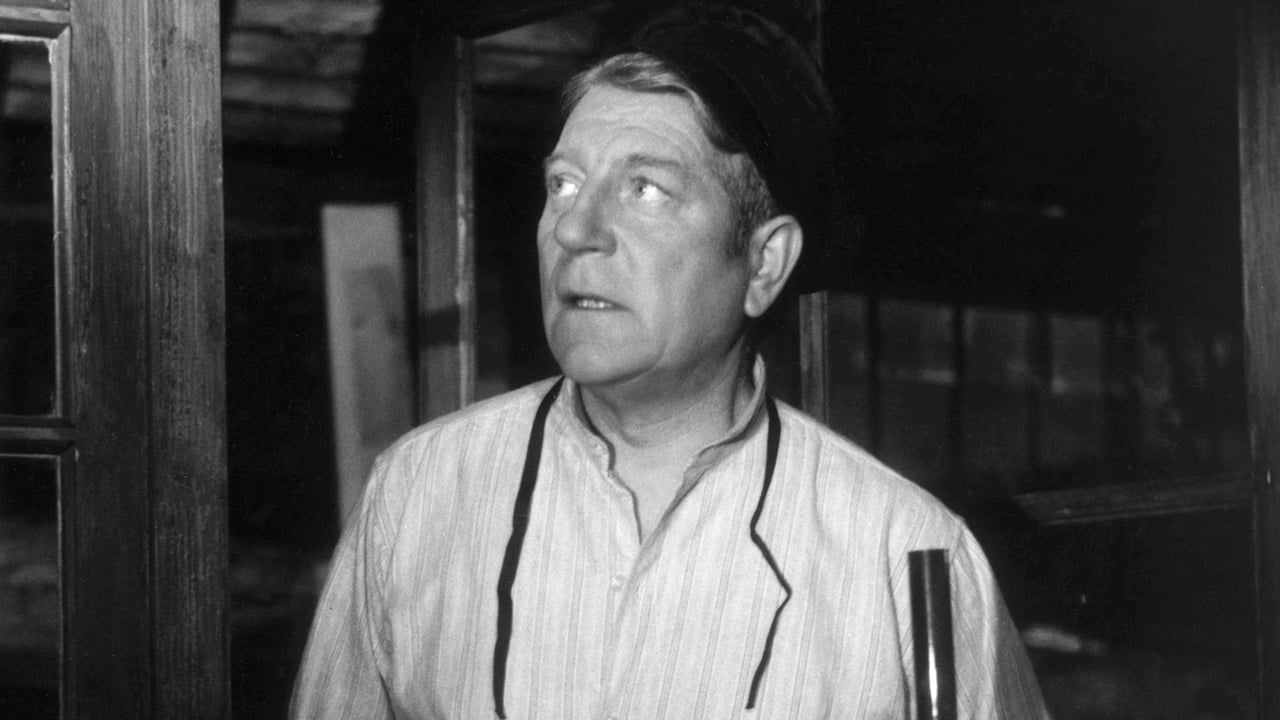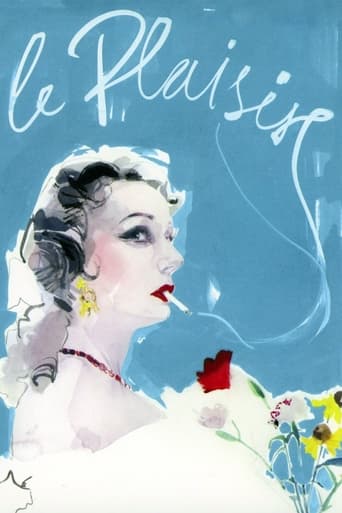

This movie (a triptych) illustrates perfectly the universe and the themes of the great French writer Guy de Maupassant. The film is based on three of his stories: The Mask, The House Tellier and The Model. Guy de Maupassant is a master in analyzing the love (sex) life of the French bourgeoisie. Males spend their evenings in brothels ('maisons closes' in French), but, when these houses are really 'closed', they fight amongst themselves verbally and physically. Other themes in these stories are innocence and its loss and (the fight against) old age.The film explains clearly that the triggers which unmask the true nature and the real motives of the protagonists here are shocks, unexpected confrontations and reactions: the shock when the males find their brothels 'closed', the shock when the villagers are confronted with 'beautiful' people from the city, the shock of being remembered of one's innocent life as a young girl, the shock inflicted by an unexpected reaction of a mistress, or the shock when a real mask is taken off one's face. However, Max Ophüls doesn't explain very well why one of the 'city' girls triggers a general sobbing of all those who are attending a Holy Communion Service. Also, the title of the film doesn't cover the essence of its content.One should read the three stories of Guy de Maupassant after having seen the film.This film with its perfect casting and a Jean Gabin in great form is a must for all lovers of true French cinema, even if it is shot here by a German.
... View MoreThis film is made up of three stories by Guy du Maupassant--all of which have something, apparently, to do with pleasure (hence the title). However, this connection is very tenuous to say the least.The first is about an old man who is vain and wants to remain young. He does this by wearing a mask as he dances. Nothing interesting here other than a sad old vain man.The second is by far the longest one. It's about a brothel in a small town and it actually has two part. In the first one, it shows the reaction of the men in the community when the place found unexpectedly closed. The second consists of these women going to see the christening of the niece of one of the sex workers. All this is well acted--very well acted. Other, however,than perpetuating the 'hooker with a heart of gold' notion, this one didn't seem to have much of a point--more just a slice of life.The third is about an artist who falls in love with one of his models. However, once they begin cohabitating, they soon get sick of each other. But, through a twist of fate, they are stuck with each other. Pretty depressing.Apparently I am in the minority on this one. While its overall score is almost 8.0 and Stanley Kubrick apparently adored the film, it left me very flat. Now this is not because of the acting or direction--it was first-rate all the way and very lovely to watch. No, my problem is that none of the stories were that interesting--particularly the first and third ones. And the stories also didn't seem to have a lot of meaning or significance or irony.
... View MoreOne of the best films I've seen this year. I've had a sketchy past with director Ophuls up to now. The only film of his that I had previously seen and liked was Liebelei, though I don't remember it well. I found La Ronde slight, and I found The Earrings of Madame de... detestable (I recall the former, which I saw about a decade ago, well enough, but don't recall the latter, which I've seen much more recently, whatsoever). Both are now on my revisit list after Le Plaisir. I can't believe I could miss this in those other two, more famous films, but Le Plaisir reveals Ophuls to be one of the great masters of cinematic invention. His shots are incredibly impressive. They look so effortless, but probably required hundreds of hours of planning. The sets are unbelievably complex. There are three stories in the film, all by Guy de Maupassant. The central story comprises probably two thirds or more of the film's running time. It is about a group of prostitutes who abandon their whorehouse on a busy Saturday night to visit the Madame's brother's family, as her niece and nephew are to be Christened on Sunday morning. The first half of this tale has to do with the enormous group of men who find the house empty and don't know what to do with themselves. The rest of it is about the women's bucolic one day vacation. The first story is a short one about an old man who wears a mask to disguise his age. In an amazing single shot, he enters a rocking ball and parties his butt off until he faints. The doctor takes him home and his wife tells him the old man's story. The final story is about the tumultuous love affair between an artist and his model (Simone Simon, the most beautiful woman to have ever lived, I think). This story is pure energy, with the couple falling in love in the course of a single take and off camera (!). Things start to go afoul, and there's this outrageously great sequence where Simon locks the artist indoors and he searches madly for the key. The two end up smashing everything in the house in what has to be one of the most emotionally draining fights in film history, and with very few actual words. All three of the tales are simple, but somehow deeply affecting. My only real complaint has to do with the picture quality of the Criterion DVD, which seems below their normal standard. The film itself is a masterpiece, or pretty close, anyway.
... View MoreThis is about something most illusory - pleasure, and various definitions of it. One man's pleasure is another's poison - personally the world depicted in such a wistful and playful way by Max Ophuls holds no attraction for me. Sex and dancing aren't everything except if you think so. But as a film this is supreme stuff, Art of a kind never witnessed outside of Ophuls and with a cinematic regard and feeling for 19th century France and the French that remains unsurpassed.Three of Maupassant's short stories are presented - he was sitting by me at the time - for me the most poignant being the first, Le Masque. The opening sequence is an incredible whirling bustling tour de force of camera, set and actor trickery, moving them all about with an astounding ease for 1952. Not once in the packed studio did something crunch into a balustrade or one of the dancers take someone's eye out - choreography so perfect as to make you gasp. We as the modern audience are constantly peeping through lattices, curtains, windows, holes etc at the action within from 1880, occasionally permitted to become part of it with the characters. The loving attention to period detail is constant and total. With so much being studio-bound, I've always wondered why the over-riding image I carry in my head of Le Plaisir is from the 2nd story, La Maison Tellier. With the jolly yokel Jean Gabin at the reins of the cartload of gaudy jolly whores including Danielle Darrieux dashing through the sunny French countryside full of life and happy at the prospect of a night off and more perfect choreography it's a joy to behold.The 3rd piece Le Modele has Simone Simon and Daniel Gelin reviewing their previous performances in La Ronde but with the ending somewhat different! Overall, a totally inconsequential ravishingly beautiful film to cherish, an ideal bookend for La Ronde - pleasure is hardly the word!
... View More